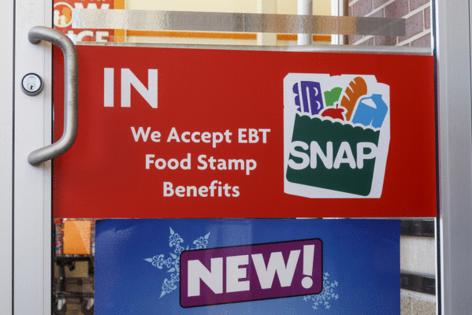Federal judge directs USDA to pay November food stamp benefits
Published in News & Features
WASHINGTON — A federal judge in Rhode Island granted a temporary restraining order Friday that would compel the government to distribute food stamp benefits for November.
Chief Judge John J. McConnell Jr. of the U.S. District Court for the District of Rhode Island made the ruling from the bench in a lawsuit brought by the Rhode Island State Council of Churches along with nonprofit groups and cities. The groups sought to force the government to pay SNAP benefits using contingency funds for fiscal years 2024 and 2025 or under Agriculture Department’s other authority.
The decision came shortly after a separate federal judge gave the department until Monday to decide whether it will either partially or fully distribute food stamp benefits for November.
Judge Indira Talwani of the U.S. District Court for the District of Massachusetts, in an order and memorandum Friday, said the Trump administration’s suspension of the Supplemental Nutrition Assistance Program, formerly known as food stamps, “is contrary to law.”
The officials from more than two dozen states who brought the case sought a declaration that the USDA is required to furnish the SNAP benefits that have already been calculated and determined by the state agencies for November 2025. The lawsuit points to two laws that together set aside $6 billion in contingency reserves to carry out operations.
But Talwani wrote that a motion for a temporary restraining order, filed earlier in the week by the states, “remains under advisement.”
Instead, Talwani gave the USDA until Monday to tell her whether they will authorize “at least reduced SNAP benefits for November and, if so, their timeline for determining whether to authorize only reduced SNAP benefits using the Contingency Funds or to authorize full SNAP benefits using both the Contingency Funds and additional available funds.”
Talwani wrote that the government’s “conclusion that USDA is statutorily prohibited from funding SNAP because Congress has not enacted new appropriations for the current fiscal year is erroneous.”
To the contrary, the government is statutorily mandated to use the previously appropriated SNAP contingency reserve when necessary and also have discretion to use other previously appropriated funds, the judge wrote.
The states “are likely to succeed on their claim that Congress intended the funding of SNAP benefits, at a reduced rate if necessary, when appropriated funds prove insufficient,” the judge wrote.
The USDA also has discretion to access other funding, such as that appropriated for the Child Nutrition Program to fund the remaining shortfall, she wrote.
The states in the lawsuit argue the USDA violated administrative law with an Oct. 10 directive to state SNAP administrators to withhold SNAP benefit issuance and an Oct. 24 letter announcing suspension of November 2025 SNAP benefits.
Agriculture Secretary Brooke Rollins and Speaker Mike Johnson, R-La., repeated at a news conference early Friday their view that the Agriculture Department can’t use the contingency fund for SNAP. Rollins called it “a lie” that it could be used and Johnson said that “Democrats are lying.”
“They know that’s a frivolous piece of litigation,” Johnson said. “I believe they know for a fact that what they filed in the court is false.”
Rollins declined to say what the department would do if the federal judge ordered the USDA to pay the benefits. She said again the contingency fund is only available if there is an underlying appropriation that falls short of the need. The partial government shutdown that began on Oct. 1 means there isn’t an appropriation.
She also said the contingency fund “doesn’t even cover, I think, half of the $9.2 billion that would be required for November SNAP.”
The USDA itself referred to the contingency fund for SNAP in the shutdown plan it released in September, ahead of the shutdown.
“In addition, Congressional intent is evident that SNAP’s operations should continue since the program has been provided with multi-year contingency funds that can be used for State Administrative Expenses to ensure that the State can also continue operations during a Federal Government shutdown. These multi-year contingency funds are also available to fund participant benefits in the event that a lapse occurs in the middle of the fiscal year.”
But the department has since removed the plan from its website.
The states that brought the lawsuit say they provide nearly 25 million individuals, in nearly 14 million households, with food assistance through SNAP.
Those states are: Massachusetts, California, Arizona, Minnesota, Connecticut, Colorado, Delaware, Hawaii, Illinois, Kansas, Kentucky, Maine, Maryland, Michigan, Nevada, New Jersey, New Mexico, New York, North Carolina, Oregon, Pennsylvania, Rhode Island, Vermont, Washington and Wisconsin.
“Trump has no excuse to withhold food assistance,” Senate Agriculture ranking member Amy Klobuchar said in post on the social media site X after the ruling. “If the admin does not issue SNAP, it is purely a cruel political decision, not a legal one.”
_____
Olivia M. Bridges contributed to this report.
_____
©2025 CQ-Roll Call, Inc., All Rights Reserved. Visit cqrollcall.com. Distributed by Tribune Content Agency, LLC.







Comments